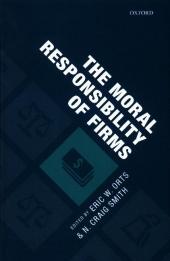 Neuerscheinungen 2017Stand: 2020-02-01 |
Schnellsuche
ISBN/Stichwort/Autor
|
Herderstra▀e 10
10625 Berlin
Tel.: 030 315 714 16
Fax 030 315 714 14
info@buchspektrum.de |

Eric W. Orts, N. Craig Smith
(Beteiligte)
The Moral Responsibility of Firms
Ed. by Eric W. Orts and Craig N. Smith
2017. 256 p. 240 mm
Verlag/Jahr: OXFORD UNIVERSITY PRESS; OUP OXFORD 2017
ISBN: 0-19-873853-6 (0198738536)
Neue ISBN: 978-0-19-873853-4 (9780198738534)
Preis und Lieferzeit: Bitte klicken
This book examines whether firms as organizations can be considered morally responsible for their actions. This question has profound practical implications as well as theoretical significance, not least when we are so frequently today confronted with misconduct in business.
Individuals are generally considered morally responsible for their actions. Who or what is responsible when those individuals become part of business organizations? Can we correctly ascribe moral responsibility to the organization itself? If so, what are the grounds for this claim and to what extent do the individuals also remain morally responsible? If not, does moral responsibility fall entirely to specific individuals within the organization and can they be
readily identified?
A perennial question in business ethics has concerned the extent to which business organizations can be correctly said to have moral responsibilities and obligations. In philosophical terms, this is a question of "corporate moral agency." Whether firms can be said to be moral agents and to have the capacity for moral responsibility has significant practical consequences. In most legal systems in the world, business firms are recognized as "persons" with the ability to own property, to maintain
and defend lawsuits, and to self-organize governance structures. To recognize that these "business persons" can also act morally or immorally as organizations, however, would justify the imposition of other legal constraints and normative expectations on organizations. In the criminal law, for
example, the idea that an organized firm may itself have criminal culpability is accepted in many countries (such as the United States) but rejected in others (such as Germany).
This book collects new contributions by leading business scholars in business ethics, philosophy, and related disciplines to extend our understanding of the "moral responsibility of firms."
Eric W. Orts is the Guardsmark Professor at the Wharton School of the University of Pennsylvania. He is a professor in the Legal Studies and Business Ethics Department with a joint appointment in the Management Department. He directs the Initiative for Global Environmental Leadership (IGEL) and serves also as an academic co-director of the FINRA at Wharton Institute for securities compliance and regulatory professionals. His primary research and teaching interests
are in corporate governance, environmental law and policy, and professional ethics. His scholarly work is widely published in academic journals and books. Prior to joining Wharton┤s faculty in 1991, Orts practiced law at Paul, Weiss, Rifkind, Wharton & Garrison in New York City. Orts is a member of
the bar of New York and the District of Columbia, and an elected member of the American Law Institute.
N. Craig Smith is the INSEAD Chaired Professor of Ethics and Social Responsibility at INSEAD, France and the Academic Director of the Corporate Social Responsibility and Ethics Research Group in the INSEAD Social Innovation Centre. He was previously on the faculties of London Business School, Georgetown University, and Harvard Business School. His research is at the intersection of business and society, encompassing business ethics, corporate social responsibility, and sustainability. As well
as a broad interest in organizational or managerial good and bad conduct, at the core of much of his research is a focus on developing understanding of corporate accountability. His current research projects examine the purpose of the firm, social contract theory, stakeholder theory, strategic drivers
of CSR/sustainability, marketing ethics, and sustainable consumption. He is the author, coauthor or coeditor of six books and over thirty academic journal articles.


